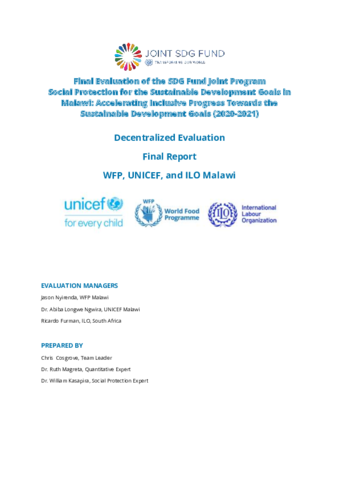
This decentralized evaluation was jointly commissioned by WFP, UNICEF and ILO in Malawi and covered the period January 2020 to September 2021. The joint programme (JP) aims to support the Government of Malawi (GoM) to enhance the Malawi social protection system to meet emergency food needs and reduce the vulnerability of those most at risk of food insecurity by 2022, while strengthening the social protection system for all vulnerable households across the lifecycle. Data collection took place from 31st August to 13th September 2021.
The evaluation focused on assessing the relevance, coherence, effectiveness, coverage, efficiency, impact, and sustainability of the programme as well as gender equality and women’s empowerment and equity.
The evaluation objectives included: (1) to assess the extent of achievement of the results and targets set out in the Joint Program Results Framework; (2) to understand the extent to which the joint program has contributed to accelerating progress towards the sustainable development goals, focusing on social protection; and (3) to meet commitments made to commission an evaluation for learning and accountability.
Some key evaluation findings included:
- The JP demonstrated that it was responsive, reactive, and adaptable to the needs caused by the COVID-19 pandemic, while also meeting the primary goal of developing a shock responsive social protection intervention model.
- The Lean Season Response (LSR) cash-based transfer component of the JP has had an economic multiplier effect on the local economy while also providing the foundation for positive human development outcomes for many of its beneficiaries.
- The JP’s contribution to the LSR has improved food security and reduced the use of negative coping strategies in the context where the program was operational.
- The JP partners' human resource costs surpass the actual programme transfers and grants raising concerns about the fiscal sustainability model used to inform government policy.
- The JP has to a larger extent achieved its goal of accelerating inclusive progress towards the sustainable development goals.
- There are still considerable challenges to roll out a more comprehensive strategy to reach all levels of government related to social protection systems strengthening.
- Despite the fact that several GoM policies offer favourable policy levers, the absence of any clear noteworthy actions on gender mainstreaming and social inclusion across the JP was a missed opportunity.
Some key recommendations from the evaluation included:
- Improve value for money analysis of shock sensitive social protection cash transfer interventions
- Strengthen targeting capacity to ensure only deserving households benefit and strengthen awareness of all local leaders on beneficiary identification and selection.
- Build sufficient technical capacity in gender, vulnerability assessment and mapping, and monitoring & evaluation units of UN partner agencies to support joint programmes.
- Increase gender equality and inclusion by improving the basket to include foods for pregnant and lactating women and children under the age of 2.
- Continue to develop a strategy to increase public funding for social protection and strengthen the financial management processes of other key stakeholders beyond the government.
- Build sufficient technical capacity in the Gender, VAM and Monitoring and Evaluation units of UN partner agencies to support the operationalization and mainstreaming of gender and social inclusion performance targets in joint programmes.
- Train GoM national and district staff on changes in the SCTP strategy and National Social Support Policy as part of dissemination efforts and to strengthen their capacity to implement social protection activities.
